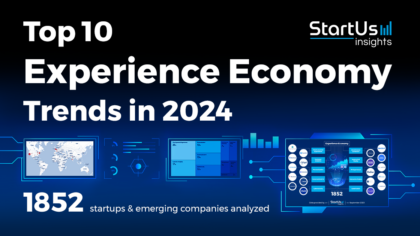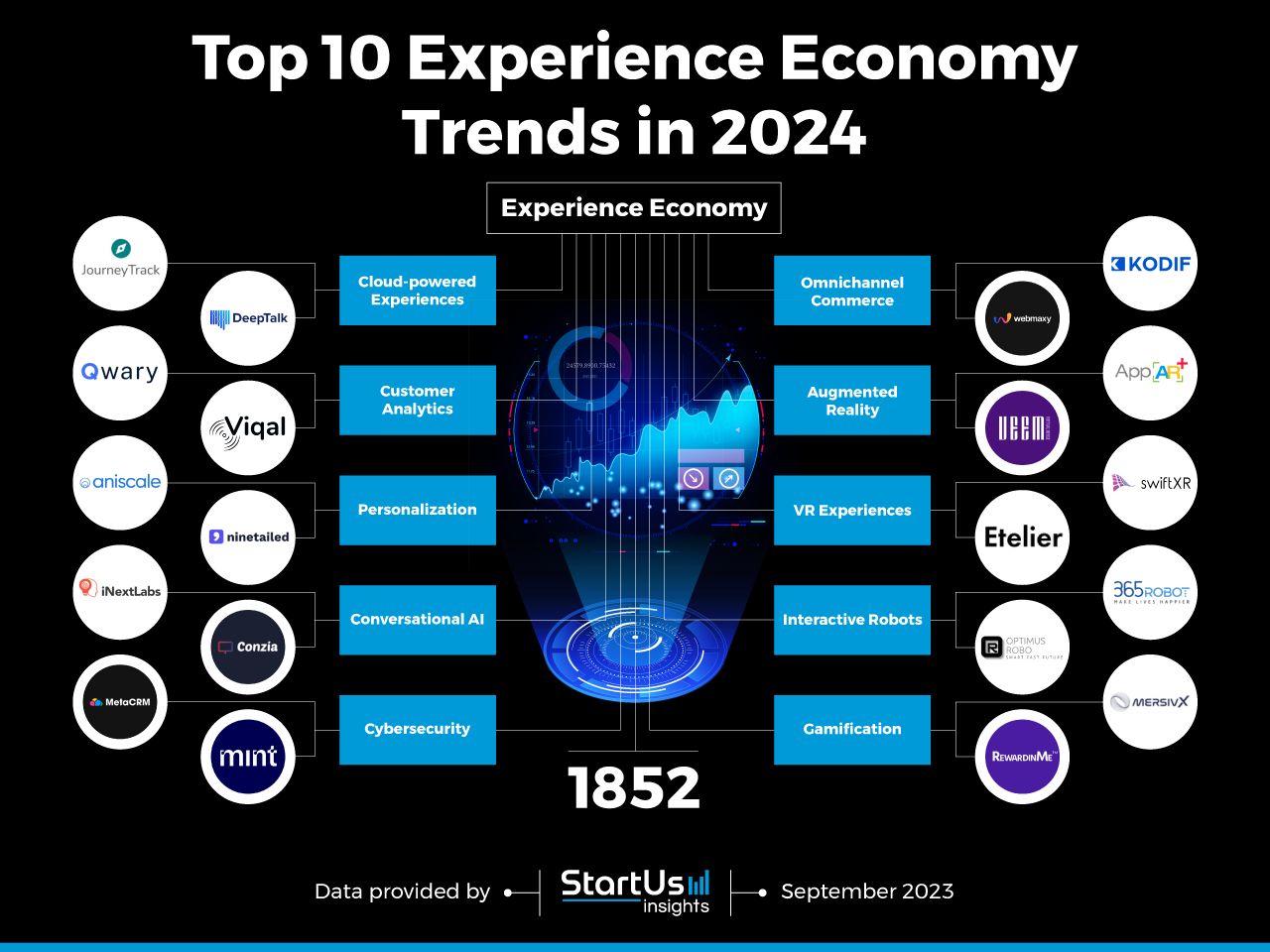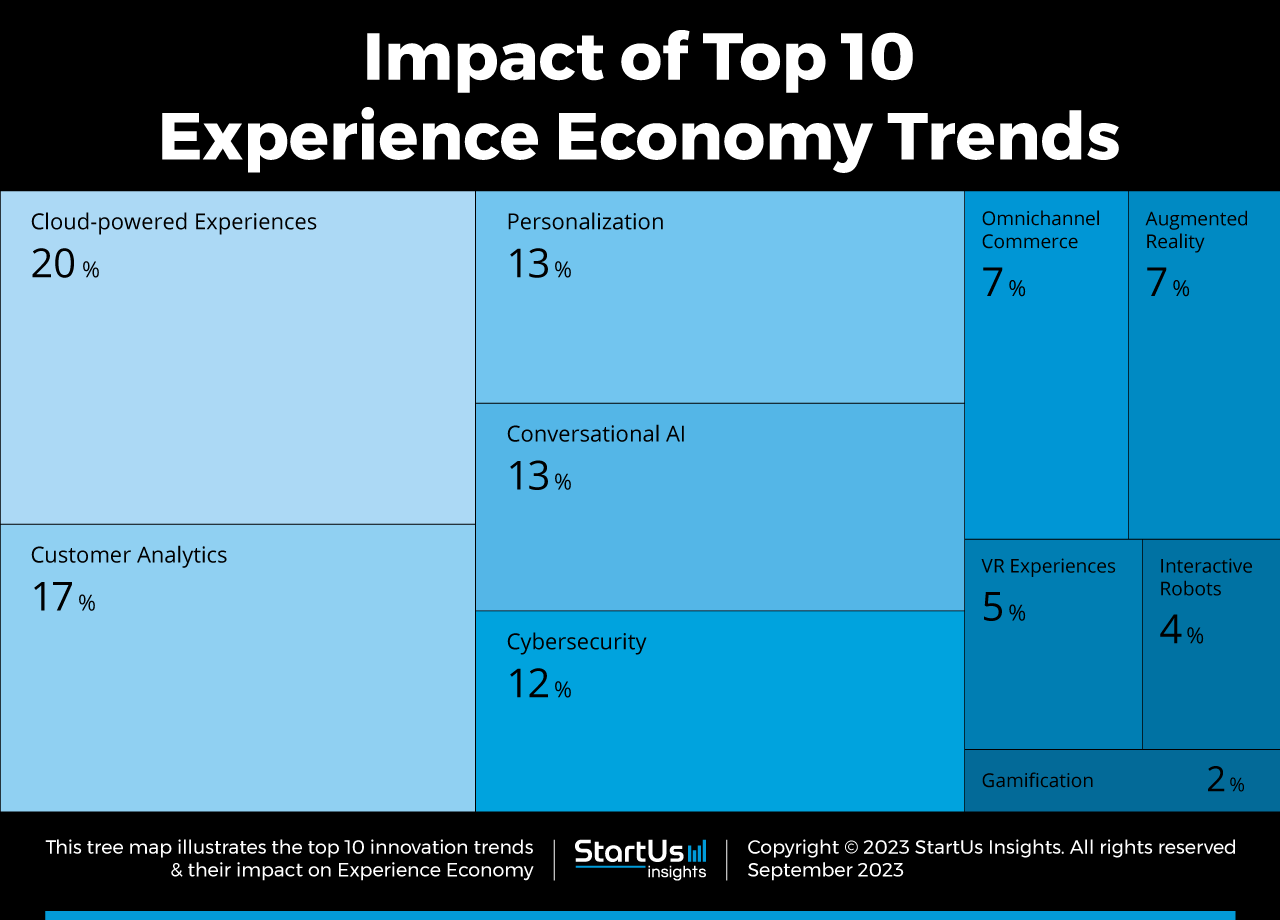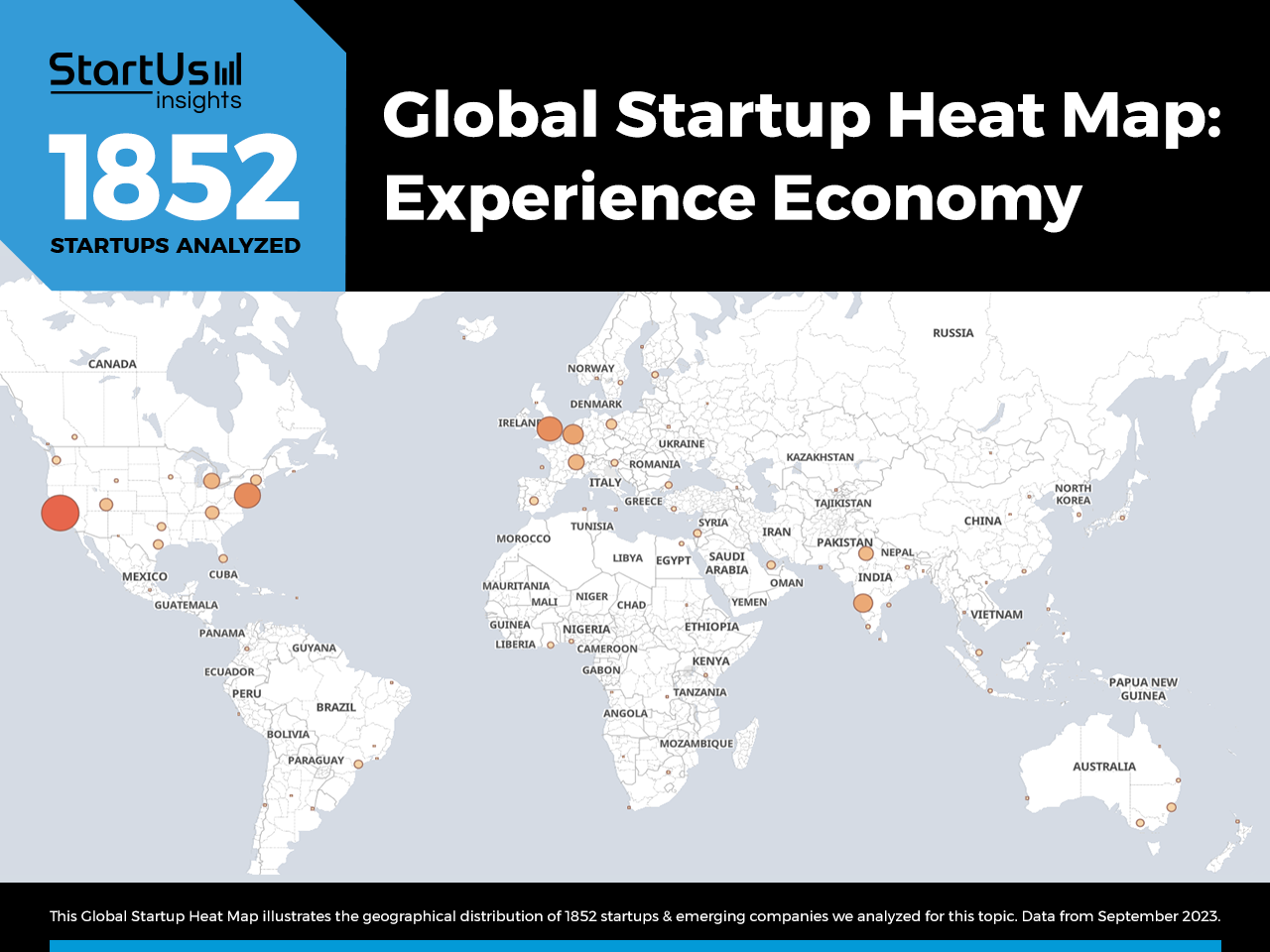Technological advancements are paving the way for businesses to interact with consumers, offering immersive and personalized experiences. This leads to the growth in the experience economy. Startups employ technologies such as cloud computing, conversational AI, and augmented & virtual reality (AR & VR), to improve experiences.
The impact of new technologies and strategies enables businesses to provide an omnichannel immersive experience to captivate consumers. This report delves into the top experience economy trends. Read more to gauge how this impacts your business and industry.
Top 10 Experience Economy Trends (2024)
- Cloud-powered Experiences
- Customer Analytics
- Personalization
- Conversational AI
- Cybersecurity
- Omnichannel Commerce
- Augmented Reality
- VR Experiences
- Interactive Robots
- Gamification
Innovation Map outlines the Top 10 Experience Economy Trends & 20 Promising Startups
For this in-depth research on the Top 10 Experience Economy Trends and startups, we analyzed a sample of 1800+ global startups & scaleups. This data-driven research provides innovation intelligence that helps you improve strategic decision-making by giving you an overview of emerging technologies in customer experiences. In the Experience Economy Innovation Map below, you get a comprehensive overview of the innovation trends & startups that impact your company.
These insights are derived by working with our Big Data & Artificial Intelligence-powered StartUs Insights Discovery Platform, covering 3 790 000+ startups & scaleups globally. As the world’s largest resource for data on emerging companies, the SaaS platform enables you to identify relevant technologies and industry trends quickly & exhaustively.
Tree Map reveals the Impact of the Top 10 Trends in the Experience Economy
Based on the Experience Economy Innovation Map, the Tree Map below highlights the Top 10 Experience Economy Trends. Startups are leveraging cloud-powered experiences to provide seamless customer journeys. Similarly, customer analytics provides insights into customer behavior thereby enhancing engagement.
Startups are increasingly personalizing their offerings to individual preferences thus facilitating unique experiences for each individual customer. Further, conversational AI fosters real-time interactions, while omnichannel commerce ensures a consistent brand experience across all touchpoints.
Moreover, startups utilize AR and VR to create immersive environments that captivate users and bridge the gap between physical and digital experiences. Similarly, interactive robotics and gamification techniques make interactions engaging and memorable and drive loyalty. Lastly, startups are utilizing cybersecurity and blockchain to ensure digitally safer and private consumer experiences.
Global Startup Heat Map covers 1852 Experience Economy Startups
The Global Startup Heat Map below highlights the global distribution of the 1800+ exemplary startups & scaleups that we analyzed for this research. Created through the StartUs Insights Discovery Platform, the Heat Map reveals high startup activity in the US, followed by Europe and India.
Below, you get to meet 20 out of these 1800+ promising startups & scaleups as well as the solutions they develop. These experience economy startups are hand-picked based on criteria such as founding year, location, funding raised & more. Depending on your specific needs, your top picks might look entirely different.
Interested to explore all 1800+ experience economy startups & scaleups?
Top 10 Experience Economy Trends in 2024
1. Cloud-powered Experiences
Cloud-powered experiences leverage the agility, and accessibility of cloud platforms to deliver customer-centric encounters seamlessly. Startups develop cloud-based platforms that deliver seamless and personalized customer journeys at scale. This enables businesses across eCommerce, FMCG, and manufacturing to dynamically adapt to evolving consumer preferences.
It also offers data-driven experiences that foster loyalty and drive revenue growth. Moreover, startups are developing software-as-a-service (SaaS) platforms to enable real-time analytics, empowering enhanced customer satisfaction and operational efficiency. Further, this technology eliminates the constraints of physical infrastructure, enabling global reach and ensuring consistent, high-quality encounters across devices.
Likewise, cloud computing eliminates the need for large upfront infrastructure investments bringing economy in resource utilization. Lastly, cloud-based platforms facilitate easy integration with other emerging technologies such as AI, AR, VR, and IoT thus exponentially enhancing the experience potential.
Journey Track advances Customer Journey Mapping
US-based startup Journey Track provides an enterprise customer journey mapping and management platform. The platform empowers customer experience (CX) design teams to create journey maps through real-time collaboration. It features persona-integrated diversity, equity, and inclusion (DEI) that identifies biases influencing the journey maps and provides research-backed recommendations to recapture churn.
With the platform’s opportunity scoring tool business decisions aligned with both customer and business needs. Additionally, it enables governance and efficient journey management through its Maps of Maps feature. Healthcare, financial services, and information technology businesses use this platform to create impactful customer experiences and increase customer lifetime value (CLV).
Deep Talk facilitates Customer Support Text Analysis
French startup Deep Talk develops a platform that enhances customer support through AI-driven text analysis. The startup’s platform analyzes the voice of customers (VoC), offering insights into net promoter score (NPS) by topic, theme, and category. It provides actionable intelligence, enabling businesses to craft customer-centric CX strategies by unifying, monitoring, and analyzing customer feedback in real-time.
Additionally, the platform offers auto-tagging, which automates the review tagging process, resulting in significant time savings and a reduction in manual work. The startup caters to businesses from the tourism, hospitality, telecommunication, automotive, logistics, and distribution industries among others.
2. Customer Analytics
Startups develop analytic solutions to harness the plethora of first-party customer data from any business and improve their experiential offerings. These solutions include customer behavior, engagement, and feedback analytics. It assists in analyzing data from voice or verbal interactions, customer emails, or chat responses.
Startups use AI, IoT, and big data to analyze customer behavior and tailor interactions that resonate deeply with them. Similarly, engagement analytics provides a comprehensive view of customer journeys, response rates, and touchpoints. These innovations advance data-driven hyper-personalization through precise customer segmentation and targeting, thus improving the return on investment (ROI).
Additionally, feedback analytics solutions aggregate structured and unstructured customer feedback, providing a holistic view of customer sentiment. This way businesses get predictive insights on future behaviors and preferences to shape delightful encounters and reduce churn. Hence, customer analytics becomes a powerful tool to drive organic growth and improve CX sustainably.
Qwary enables User Product Feedback
Qwary is a US-based startup that develops a survey platform to gather meaningful customer feedback and insights from user actions. The platform provides real-time insights by collecting feedback directly within products and identifying user challenges and preferences. This optimizes user experience and enables prioritizing feature development that drives user adoption.
Moreover, the platform enables product teams to share and analyze user feedback, streamline the in-product survey process, and facilitate targeted user engagement. Product-centric businesses use the startup’s platform to get real-time insights for agile decision-making.
Viqal provides Customer Voice Analysis
Dutch startup Viqal builds a smart voice technology that enables real-time issue resolution in customer service. The Viqal Platform detects and prevents issues oblivious to businesses and aims to prevent negative reviews. Its active and passive issue detection identifies problems by analyzing guest questions, feedback, calls, emotions, keyword tagging, and guest experience insights.
The platform captures conversational data at physical customer touchpoints, such as reception desks and dining areas for hotels and restaurants. It provides AI-generated reports highlighting performance insights tailored to specific key performance indicators (KPIs) and target audiences. Viqal’s technology combines conversation and emotion analytics to reduce negative feedback and complaints.
3. Personalization
Personalization emerges as a pivotal strategy in creating an intimate, bespoke customer journey that transcends the limitations of traditional mass marketing. Through advanced data analytics and AI-driven technologies, businesses are crafting hyper-relevant experiences, ranging from tailored recommendations to customized messaging.
This results in an emotional resonance that forges enduring connections and cultivates brand loyalty. Startups utilize tools to customize customer experiences to improve engagement, retention, customer satisfaction, and conversion rates. It also results in reduced cart abandonment, minimized information overload, and optimized marketing costs. However, personalization poses ethical concerns thus, startups are developing solutions that adopt responsible data practices in regard to customer privacy and consent.
Ninetailed enables Instant Personalized Experiences
German startup Ninetailed develops a headless personalization tool designed for modern web architectures, including headless content management systems (CMSs) and Javascript-API-Markup stacks (JAMstack). The platform utilizes MACH architecture with API-first personalization, allowing businesses to tailor content seamlessly without compromising performance.
It integrates with various content sources, providing a composable architecture that accelerates SEO, brand awareness, and revenue. Marketing and sales teams use Ninetailed to ensure privacy-first personalization by leveraging first-party data to create relevant customer experiences without tracking users.
Aniscale develops a Personalized Video Platform
Israeli startup Aniscale provides an eponymous platform to generate personalized videos at scale using creative studio templates. Aniscale features a cloud platform and the Aniscale API that enable prompt-based personalized video creation. The platform readily integrates into and enables text-to-video creation from existing systems.
Moreover, it provides a bulk personalized video creation option by uploading video data input as a CSV file. Marketing teams use Aniscale to reduce time in creating personalized promotional, informative, and event videos that increase engagement and improve conversions.
4. Conversational AI
Automated but seamless customer interactions are paramount in enhancing customer experience and reducing costs. Startups develop conversational AI solutions that leverage natural language processing (NLP) and machine learning (ML) to adapt to customers’ tone and engagement styles. This results in dynamic, human-like, and real-time conversations across platforms.
Startups develop chatbots and virtual assistants that produce personalized and contextually-aware communication instantaneously. This streamlines customer support by reducing response time, offering tailored recommendations, and capturing real-time customer feedback. Further, conversational bots enable round-the-clock and multilingual customer support bringing opportunities for scaling globally.
Additionally, these innovative chatbots ensure consistency in brand messaging while handling complex queries in real-time, which otherwise require constant human vigilance. Conversational AI solutions seamlessly integrate with existing CRM and backend systems, automating workflows for better utilization of human resources.
Conzia provides Communications Platform as a Service (CPaaS)
German startup Conzia offers a cloud-based communications platform-as-a-service (CPaaS) that centralizes customer interactions across multiple messaging channels. The platform integrates with common messaging channels like WhatsApp, Messenger, Telegram, Viber, WeChat, and SMS.
It also enables integrations with messaging APIs, customer relationship management (CRM) systems, content management systems (CMSs), and marketplaces, ensuring unified customer support. Conzia’s AI-powered chatbots streamline conversational commerce across all the above-mentioned channels and automate responses to the majority of customer inquiries. This reduces CX agent workloads, provides real-time insights, and improves response times, team efficiency, and revenue while enhancing customer satisfaction.
iNextLabs offers Generative AI Messenger
Singaporean startup iNextLabs provides a unified platform equipped with automated chatbots, aiming to revamp customer interactions. The platform’s Notify feature utilizes advanced conversational AI, allowing customers to engage 24/7 on popular messaging platforms in a human-like way. It ensures quicker issue resolution and interaction personalization thereby enhancing the overall customer experience. iNextLabs provides ready-to-use solutions for the healthcare, food and beverage, banking, and retail businesses.
5. Cybersecurity
Businesses struggle to create lasting experiences and impressions due to a lack of trust and security. Therefore startups utilize cybersecurity solutions and blockchain technology to enhance privacy and safety in the digital experience economy. It also facilitates the delivery of privacy-safe experiences.
Similarly, startups utilize smart contracts to safeguard customer transactions to minimize fraud and identity theft as a part of their digital experience. This makes the experience of cross-border transactions streamlined, eliminates exorbitant fees, and delays, and enhances supply chain transparency.
Thus, DTL, tokenization, and safer digital assets enable businesses to fortify their digital infrastructure and deliver trustworthy, and seamless experiences. Meanwhile, startups leverage cybersecurity measures to guard against cyber threats and prevent customer data leaks, ensuring customer confidence and business continuity. Such privacy-compliant innovations enhance customer engagement and create new avenues for value exchange.
MetaCRM offers Blockchain-based CRM
Taiwanese startup MetaCRM builds a Web3-centric CRM solution enabling on-chain product feedback surveys. The startup’s CRM suite of tools includes MetaForm, which is a blockchain-native survey tool that connects to multiple notable blockchains. Furthermore, it enables its clients to gain insights from web3 users through on-chain analytics.
Its cross-chain survey-to-earn feature incentivizes users with rewards for survey completion. Web3 companies use this tool to improve customer support, cybersecurity, and community engagement for their own products and services.
Mint offers Gated NFT Experiences
US-based startup Mint enables blockchain-based immersive community interactions through its tokenization platform. Mint’s platform facilitates brands in launching, selling, and distributing NFT collections and token campaigns to enhance fan connection. It fosters brand loyalty by providing tokenized access to exclusive rewards and experiences within a brand-centric environment. The platform offers a connected engagement experience through peer-to-peer (P2P) trading, gated commerce, and proof of attendance or participation (POAP) to exclusive events.

6. Omnichannel Commerce
Customer journeys are multifaceted and span across different mediums, therefore solutions advancing omnichannel commerce experience are in demand. Such tools break silos between online and offline operations and ensure a consistent and coherent brand experience across all channels.
Innovations in omnichannel commerce allow businesses to engage customers on their preferred channels, offering unified engagement instances and a single view of customer data. It empowers businesses to meet customers at each touchpoint, ultimately driving loyalty, increasing sales, and solidifying brand perception. Additionally, engaging customers in multiple channels provides businesses with valuable insights into customer behavior that empower informed decision-making and continuous experience optimization.
Webmaxy offers Omnichannel Customer Support
Indian startup WebMaxy ensures improved CX through its omni-channel support solution. This tool enables support teams to respond to customers from a unified dashboard by consolidating interactions from various platforms. It reduces first response time via pre-set automated replies to customer queries, supports multiple customer support representatives, and improves the brand NPS. E-commerce brands use this platform to improve their omnichannel customer experience and positively influence customer decisions as per business objectives.
Kodif offers Self-service CX
US-based startup Kodif provides a low-code omnichannel self-service automation solution for businesses that sell online. The Kodif Platform enables automated business interactions with customers across their preferred channels, including web, email, and SMS. This enables customers to self-serve by finding answers to queries and resolving issues seamlessly across multiple channels. Businesses use this platform to improve agent efficiency metrics, ticket deflection status, and improve self-serve resolutions.
7. Augmented Reality
Augmented Reality (AR) emerges as an interactive medium to overlay digital information onto the physical world and create immersive and interactive encounters. From retail and entertainment to education and tourism, AR enriches experiences across industries and enables customers to visualize products in their own environment.
Brands leverage this virtue to enhance their customer experience and accelerate their decision-making process to increase revenue opportunities. Startups develop interactive AR applications to engage users in unique, memorable ways, fostering deeper connections. Additionally, AR-powered training and simulations elevate learning experiences, ensuring better employee experience as well as new product and service adoption.
Examples of AR experiences include virtual try-ons in the fashion and beauty industry or spatial navigation in stores, exhibitions, or events. Thus, AR empowers businesses and brands to provide accessible, realistic, and convenient interactions and inclusive experiences for all customers globally.
MashLab – Game Studio advances AR-backed Product Catalogs
Saudi Arabian startup MashLab – Game Studio develops Virtual Merge (VEEM), which is an integrated AR development platform. VEEM offers virtualization solutions via its AR-backed product catalogs and store or product locator services. These product catalogs provide a fully integrated virtual commerce system that includes payment solutions, product delivery, loyalty rewards, and adaptive customer care. Brands working in the retail, education, automotive, healthcare, and tourism sectors use VEEM to provide near-real customer experiences in virtual environments.
AppAR provides a 3D Product Viewer
Chilean startup Appar.io develops an eponymous AR widget for smartphones. The AppAR App enables businesses to leverage mobile AR and showcase products augmented in 3D. Users add annotations, dimensions, collections, and other custom call-to-actions (CTAs) in the virtual products.
It empowers eCommerce businesses to enable product visualization in physical spaces by transforming them into captivating digital landscapes. The app emphasizes user engagement, improves user shopping experience, enables product trials, increases conversion rates across multiple channels, and decreases returns.
8. VR Experiences
VR enables users to step into virtual worlds and computer-generated environments while facilitating customer engagement beyond the limitations of digital interactions. Therefore startups develop VR-based solutions to create awe-inspiring customer experiences. Innovative VR-based solutions range from immersive training simulations to virtual tours and interactive gaming.
Businesses use a spectrum of VR applications to captivate, educate, and engage their customers and employees to optimize business performance. Further, startups utilize virtual environments to create experiences that are accessible to individuals with disabilities and cater to previously unexplored markets.
Such virtual interactions also enhance patient experiences during treatment or bring novelty to the service experience of traditional businesses. In conclusion, VR is transforming marketing and enabling businesses to thrive in digital, immersive, and customer-centric marketplaces.
SwiftXR enables VR Experience Design
Nigerian startup SwiftXR provides a no-code VR platform designed to enable users to effortlessly create virtual reality content. The platform features drag-and-drop functionality that eases the movement of elements in the virtual environment design, eliminating the need for repetitive coding. Moreover, it facilitates the creation of lightweight interactive 3D and VR experiences that enhance engagement and website product sales. SwiftXR caters to customers in the education, e-commerce, real estate, and digital art economies.
Etelier facilitates Digital Fashion Experiences
US-based startup Etelier advances the Web3 fashion economy through its human digital body IDs. The startup leverages advanced computer vision and transforms video footage from standard cameras into volumetric assets that capture body details from all angles.
The resultant digital human body ID enables fashion retailers to elevate their customers’ phygital experience by offering real-life personalized experiences virtually. Further, the startup’s technology empowers retailers in optimizing apparel product lifecycle management, providing smart analytics, and authentic and a blockchain digital wardrobe.
9. Interactive Robots
Interactive Robots, equipped with advanced AI and sensory capabilities, offer dynamic, customer-centric engagement across industries. Startups build service robots to enhance customer service by providing quick and accurate information, reducing wait times, and ensuring consistent interactions.
In retail, robots guide customers through stores, while in healthcare assist with tasks, provide support to medical staff, and save time. Moreover, interactive robots stimulate curiosity and brand memorability therefore startups develop a range of potential applications to advance the experience economy.
While robots improve assistance accessibility at all times, they also enhance customer service experience efficiency in high-traffic areas or busy environments. Many brands use robots in customer interactions as an innovative branding strategy to create a memorable and futuristic image and garner attention. Thus, besides bringing task efficiency through automation, robots inherently provide entertaining experiences in any physical or service environment.
Optimus Robo digitizes Customer Interaction Robots
UAE-based startup Optimus Robo offers a diverse range of robots designed for various sectors, including retail and catering. These robots enhance customer service, automate routine tasks, and provide innovative solutions for businesses. The startup’s robots are capable of automatic meal delivery, autonomous catering, emotion recognition, auto-balancing video conferencing, and front desk tasks. The startup’s robots improve overall operational efficiency for businesses in hospitality, retail, catering, research labs, and public infrastructure.
365Robot facilitates Robotic Waiter
Singaporean startup 365Robot builds Robot Waiter, a robotic solution designed to enhance efficiency and customer experience in restaurants. Its Robot Waiter features 3D depth detection to seamlessly move in the service environment by avoiding obstacles. Further, it leverages dual simultaneous localization and mapping (SLAM) for precise navigation and offers autonomous multi-robot cooperation within a single premise.
Additionally, it operates in various modes, including delivery, promotion, guidance, cruise, and collection, offering versatile usage as per manpower shortage. Restaurants, hotels, hospitals, nursing homes, offices, and shopping malls use the startup’s robots to handle manpower shortages cost-effectively maintaining the service experience.
10. Gamification
Gamification leverages competition, rewards, and challenges to stimulate participation and motivation creating a new class of goal-oriented experience. Startups utilize the heightened engagement levels that gamification entails in non-gaming contexts to develop experience-enhancing solutions.
Additionally, businesses leverage gamified experiences to create interactive encounters for learning, skill development, and brand loyalty. Moreover, businesses use gamification as a tool for community-building, collaboration, and organic publicity. It drives customer retention, as users return to engage with the brand in pursuit of rewards and recognition.
Further, startups build innovative gaming solutions including wearables and smartphone applications, which empower behavioral change by incentivizing desired behaviors, like making purchases. This enhances the customer experience while driving customer actions in alignment with the business objectives as well as improves customer retention. Lastly, gamified solutions enable brands to expand their customer base and increase brand advocacy all the while establishing themselves as unique.
RewardinMe enables Gamification Engagement Solution
Malaysian startup RewardinMe offers a gamification engagement platform designed to elevate employee engagement, marketing, customer advocacy, and learning. The RewardinMe platform offers a white-label front-end campaign editor, a card-based setting for swift branded game design, and dynamic content management.
Users set algorithms, manage prizes, and send automatic notifications to winners. Additionally, the platform provides detailed analytics to track game progress and monitor player interactions, enhancing the overall gamification experience. Fast-moving consumer goods (FMCG), banks, media, education, insurance, sports, tourism, and retail brands use the startup’s platform to create their own branded games.
MersivX provides 3D Realistic Gaming Commerce
Israeli startup MersivX develops a virtual-commerce platform that enables brands to create an immersive 3D realistic gaming experience. This platform utilizes smart compression technology that delivers a high-quality shopping environment sans a graphics card. This enables businesses to create gamified shopping experiences and lets users interact socially with friends and sellers.
MersivX’s advanced analytics track customers’ eye movements and shopping behavior to provide personalized experiences tailored to shoppers’ interests. The platform designs gamified commerce solutions for various industries, including fashion, beauty, home decor, jewelry, and grocery to upgrade customer acquisition.
Discover all Experience Economy Trends, Technologies & Startups
The experience economy emphasizes creating memorable and immersive experiences to elevate sustainability and inclusivity. The need for differentiation in phygital experiences is driving businesses to quickly adapt. Emerging technologies are enabling this fusion, allowing for a high degree of interoperability.
These trends in the experience economy and top startups outlined in this report only scratch the surface of trends we identified during our data-driven innovation & startup scouting process. Identifying new opportunities & emerging technologies to implement into your business goes a long way in gaining a competitive advantage.











